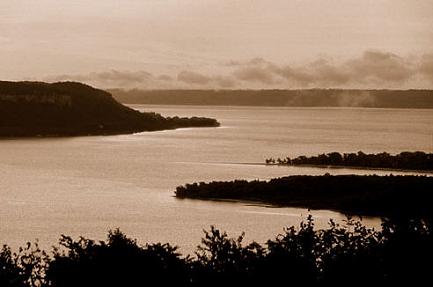Ένας γέροντας στην ακροποταμιά / An Old Man on the River Bank
Γιώργος Σεφέρης / George Seferis
Στον Νάνη Παναγιωτόπουλο
 |
Κι όμως πρέπει να λογαριάσουμε πώς προχωρούμε.
Να αισθάνεσαι δε φτάνει μήτε να σκέπτεσαι μήτε να κινείσαι
μήτε να κινδυνεύει το σώμα σου στην παλιά πολεμίστρα,
όταν το λάδι ζεματιστό και το λιωμένο μολύβι αυλακώνουνε τα τειχιά.
Κι όμως πρέπει να λογαριάσουμε κατά πού προχωρούμε,
όχι καθώς ο πόνος μας το θέλει και τα πεινασμένα παιδιά μας
και το χάσμα τής πρόσκλησης των συντρόφων από τον αντίπερα γιαλό∙
μήτε καθώς το ψιθυρίζει το μελανιασμένο φως στο πρόχειρο νοσοκομείο,
το φαρμακευτικό λαμπύρισμα στο προσκέφαλο του παλικαριού που χειρουργήθηκε το μεσημέρι∙
αλλά με κάποιον άλλο τρόπο, μπορεί να θέλω να πω καθώς
το μακρύ ποτάμι που βγαίνει από τις μεγάλες λίμνες τις κλειστές βαθιά στην Αφρική
και ήτανε κάποτε θεός κι έπειτα γένηκε δρόμος και δωρητής και δικαστής και δέλτα∙
που δεν είναι ποτές του το ίδιο, κατά που δίδασκαν οι παλαιοί γραμματισμένοι,
κι ωστόσο μένει πάντα το ίδιο σώμα, το ίδιο στρώμα, και το ίδιο Σημείο,
ο ίδιος προσανατολισμός.
Δε θέλω τίποτε άλλο παρά να μιλήσω απλά, να μου δοθεί ετούτη η χάρη.
Γιατί και το τραγούδι το φορτώσαμε με τόσες μουσικές που σιγά-σιγά βουλιάζει
και την τέχνη μας τη στολίσαμε τόσο πολύ που φαγώθηκε από τα μαλάματα το πρόσωπό της
κι είναι καιρός να πούμε τα λιγοστά μας λόγια γιατί η ψυχή μας αύριο κάνει πανιά.
Αν είναι ανθρώπινος ο πόνος δεν είμαστε άνθρωποι μόνο για να πονούμε
γι' αυτό συλλογίζομαι τόσο πολύ, τούτες τις μέρες, το μεγάλο ποτάμι
αυτό το νόημα που προχωρεί ανάμεσα σε βότανα και σε χόρτα
και ζωντανά που βόσκουν και ξεδιψούν κι ανθρώπους που σπέρνουν και που θερίζουν
και σε μεγάλους τάφους ακόμη και μικρές κατοικίες των νεκρών.
Αυτό το ρέμα που τραβάει το δρόμο του και που δεν είναι τόσο διαφορετικό από το αίμα των ανθρώπων
κι από τα μάτια των ανθρώπων όταν κοιτάζουν ίσια-πέρα χωρίς το φόβο μες στην καρδιά τους,
χωρίς την καθημερινή τρεμούλα για μικροπράματα ή έστω και για τα μεγάλα∙
όταν κοιτάζουν ίσια-πέρα καθώς ο στρατοκόπος που συνήθισε ν' αναμετρά το δρόμο του με τ' άστρα,
όχι όπως εμείς, την άλλη μέρα, κοιτάζοντας το κλειστό περιβόλι στο κοιμισμένο αράπικο σπίτι,
πίσω από τα καφασωτά, το δροσερό περιβολάκι ν' αλλάζει σχήμα, να μεγαλώνει και να μικραίνει∙
αλλάζοντας καθώς κοιτάζαμε, κι εμείς, το σχήμα τού πόθου μας και της καρδιάς μας,
στη στάλα τού μεσημεριού, εμείς το υπομονετικό ζυμάρι ενός κόσμου που μας διώχνει και που μας πλάθει,
πιασμένοι στα πλουμισμένα δίχτυα μιας ζωής που ήτανε σωστή κι έγινε σκόνη και βούλιαξε μέσα στην άμμο
αφήνοντας πίσω της μονάχα εκείνο το απροσδιόριστο λίκνισμα που μας ζάλισε μιας αψηλής φοινικιάς.
Κάιρο, 20 Ιουνίου '42
Από τη συλλογή Ημερολόγιο καταστρώματος, Β' (1944)
An Old Man on the River Bank
Translated by Edmund Keeley and Philip Sherrard
___________________________________________________________________________________
And yet we should consider how we go forward.
To feel is not enough, nor to think, nor to move
nor to put your body in danger in front of an old loophole
when scalding oil and molten lead furrow the walls.
And yet we should consider towards what we go forward,
not as our pain would have it, and our hungry children
and the chasm between us and the companions calling from the opposite shore;
nor as the bluish light whispers it in an improvised hospital,
the pharmaceutic glimmer on the pillow of the youth operated on at noon;
but it should be in some other way, I would say like
the long river that emerges from the great lakes enclosed deep in Africa,
that was once a god and then became a road and a benefactor, a judge and a delta;
that is never the same, as the ancient wise men taught,
and yet always remains the same body, the same bed, and the same Sign,
the same orientation.
I want nothing more than to speak simply, to be granted that grace.
Because we’ve loaded even our song with so much music that it’s slowly sinking
and we’ve decorated our art so much that its features have been eaten away by gold
and it’s time to say our few words because tomorrow our soul sets sail.
If pain is human we are not human beings merely to suffer pain;
that’s why I think so much these days about the great river,
this meaning that moves forward among herbs and greenery
and beasts that graze and drink, men who sow and harvest,
great tombs even and small habitations of the dead.
This current that goes its way and that is not so different from the blood of men,
from the eyes of men when they look straight ahead without fear in their hearts,
without the daily tremor for trivialities or even for important things;
when they look straight ahead like the traveller who is used to gauging his way by the stars,
not like us, the other day, gazing at the enclosed garden of a sleepy Arab house,
behind the lattices the cool garden changing shape, growing larger and smaller,
we too changing, as we gazed, the shape of our desire and our hearts,
at noon’s precipitation, we the patient dough of a world that throws us out and kneads us,
caught in the embroidered nets of a life that was as it should be and then became dust and sank into the sands
leaving behind it only that vague dizzying sway of a tall palm tree.
Cairo, 20 June ’42
___________________________________________________________________________________
Βρήκαμε το ποίημα εδώ. Source. Λίγο για τον ποιητή. About the poet. Seferis as photographer. Illustration.
Μετάφραση απο τον Edmund Keeley και τον Philip Sherrard / Translated by Edmund Keeley and Philip Sherrard © 1995 by Princeton University Press
